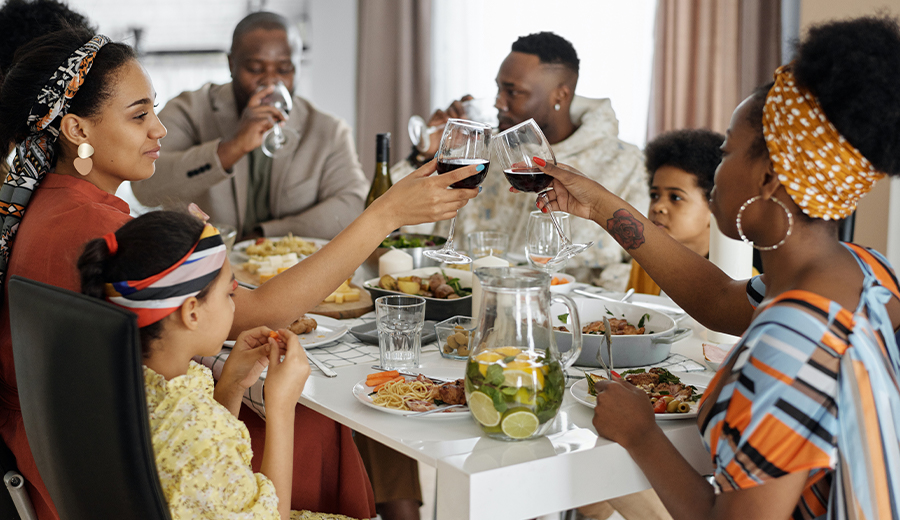Written By: Lisa A. Goldstein
The holidays bring to mind joyful festivities and gatherings with family and friends. For people with hearing loss, however, this time of the year brings a unique set of challenges. Volta Voices talked to some adults who are deaf and hard of hearing around the world who share their expert tips.
Disclaimer: During COVID-19, the Centers for Disease Control and Prevention offers considerations for “small gatherings of families and friends.” Some countries may still permit gatherings if cases are down. Some of these recommendations are timeless, while others are meant for in-person gatherings during normal times.
Conversation Tips
In November, AG Bell immediate past chair Catharine McNally—a cochlear implant recipient—presented a webinar for parents of children who are deaf and hard of hearing called “Thriving Through: How Family and Technology Make a Difference.” One of her tips is to have meaningful small group conversations before the main meal, typically during a social hour in which appetizers and/or cocktails are being served. This time might be more informal and allow for easier mingling. After the main course is also a good time as well. Julie Grisham, who has cochlear implants, is a fan of gathering in smaller groups because conversations are easier to handle.
McNally’s second tip is to sit next to an empathetic person, such as someone you know well and can pull you into conversations. Don’t position yourself next to someone with whom you’re not acquainted, McNally cautions, unless they’re close and talk frequently. “That just leads to uncomfortable small talk,” she says.
Maria Gracia Injoque, 30, of Lima, Peru, is deaf or hard of hearing and knows all too well the difficulties of gatherings with family and friends. The psychologist and former student of the Peruvian Center of Learning and Language says it can be easy to become lost in a conversation, “especially because sometimes there are moments where people speak at the same time and I cannot read the lips of two people at the same time.”
Injoque usually has good experiences because she tries to pay attention to what people say, and if she doesn’t understand something, she asks the person next to her. But if she completely misses the group talk, she looks for someone to have a two-way conversation instead.
Logistics
Matias Donoso, 31, from Santiago, Chile, has congenital profound hearing loss and a cochlear implant. He has a program on his cochlear implant that reduces annoying noises to “facilitate a fluent conversation with those close to me.” When he eats in a restaurant, he always makes sure to find an environment that’s as quiet as possible and with good lighting. He always opts for a round table to better see everyone, if one’s available.
McNally says a good position to sit at the table is at a corner or one of the ends. If you’re in the middle, you’ll have a harder time figuring out which side to focus on and there won’t be a natural group with whom to mesh. An obvious tip is to eliminate tall centerpieces. She also suggests offering a buffet in the kitchen so conversations at the table aren’t interrupted by people saying, “Pass the turkey!”
Be Proactive
The key is to advocate for yourself. Injoque shares some tips that fall in this category:
- Mention you have hearing loss when you’re among new people. Most of them don’t know yet how to communicate properly, but eventually they will.
- Ask the person next to you what the group is talking about or about something you don’t understand. By doing so, you proactively reinsert yourself into a conversation among several people.
- Feel free to offer your opinion without fear that people won’t understand you. Usually your close circle knows about your hearing loss and will help you as needed and value your opinion.
- Try to talk to someone close to you to entertain yourself. Don’t get bored just because you don’t understand what everyone is talking about.
Another valuable suggestion from McNally is to “know your number.” If you find yourself getting lost when a certain number of people are in a conversation, figure out what that number is. “Mine’s five,” says McNally. “If there’s a group more than five, I know to not try and join.”
Kids Can Advocate for Themselves, Too!
Parents can ensure that their child who is deaf or hard of hearing is included in the conversation. An example McNally provides is when a mom seated next to her kid says, “Oh Joe, tell them about your time in Colorado!”
All the tips provided here apply to children too. The earlier they learn to advocate for themselves in a social setting, the better. Being upfront about their hearing loss is important. In fact, gatherings with family and friends are the perfect occasions to practice this advocacy. By the time the child is an adult, they will be far more comfortable in any situation!

